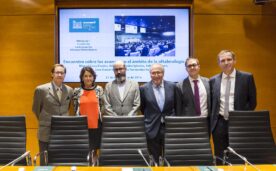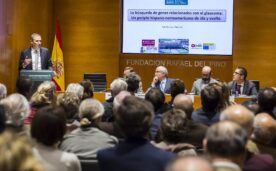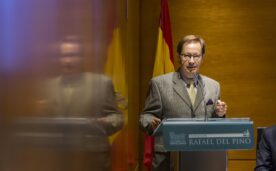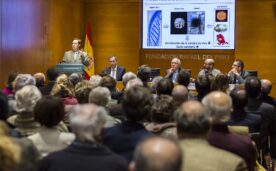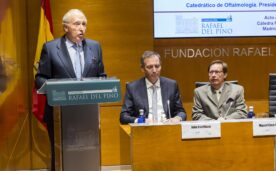On 21 November 2016, the Rafael del Pino Foundation organised a meeting on advances in the field of ophthalmology with the participation of doctors Luis Fernández-Vega, Héctor González Iglesias, Jose Daniel Aroca, Julio Escribano and Miguel Coca-Prados.
The event took place according to the following programme:
The Rafael del Pino Chair at the Ophthalmological Research Foundation (2009-2016): Achievements and the future of Glaucoma research
Miguel Coca-Prados is Rafael del Pino Professor in genetic ophthalmology of eye diseases. Professor Coca-Prados holds a degree in Biology from the University of Salamanca. Throughout his prolific academic and research career he has been: Professor Emeritus of Ophthalmology and Visual Science at Yale University; Post-doctoral Fellow in the Department of Microbiology of Dr. David A. Wolff at Ohio State University; Post-doctoral Fellow in the Department of Molecular Cell Biology at Rockefeller University in New York and Ophthalmology Research Scientist and Principal Investigator in Ophthalmology at Yale University School of Medicine. He has published numerous scientific papers and his research work has received several awards, most recently in 2006, when he received the Yla-Pfizer Visiting Professorship Award. He is a Principal Investigator at the Ophthalmology Research Foundation.
New technologies for the study of age-related eye diseases: Glaucoma and Macular Degeneration
Héctor González Iglesias holds a degree in Chemistry from the University of Oviedo and a European PhD in Chemistry from the University of Oviedo. He has made numerous scientific publications, book chapters and also several collaborations in conferences. He is a member of the International Biometals Society (ISB); the Spanish Society of Analytical Chemistry (SEQA); and Zinc-Net: the Network for the Biology of Zinc (UK). He is currently working as a Postdoctoral Researcher in the Ocular Genetics Unit of the Ophthalmological Research Foundation.
The search for genes related to glaucoma: A Spanish-American journey back and forth
Julio Escribano is Professor of Genetics at the University of Castilla-La Mancha and holds a PhD in Biological Sciences from the Ramón y Cajal Hospital in Madrid and the Complutense University of Madrid. He is director of the Human Genetics group, belonging to the UCLM and to the thematic network of
OFTARED network cooperative research, funded by the Instituto de Salud Carlos III. Dr. Escribano has received more than 30 awards for his scientific activity.
The genetics of glaucoma: from fish to men
Jose Daniel Aroca, José Daniel Aroca Aguilar has a degree in Biochemistry from the University of Murcia. He has worked in the Biomembranes group of the Department of Biochemistry and Molecular Biology A of the University of Murcia and in the Human Molecular Genetics group of the Faculty of Medicine of Albacete. In 2009 he obtained his PhD degree, and his thesis was awarded the Extraordinary PhD Prize. He has also participated in a dozen research projects focused on the study of the genetic basis of glaucoma, and is the author of 15 articles published in relevant journals in the field. He is currently Associate Professor in the Human Molecular Genetics Group at the UCLM, member of the Institute for Research in Neurological Disabilities (IDINE) and of the RETICS network of Ocular Pathology of the Carlos III Institute of Health.
From the scientific laboratory to the patient: Success of a shared adventure between Foundations
Luis Fernández-Vega Sanz studied Medicine at the Autonomous University of Madrid and later moved to the Complutense University of Madrid where he read his doctoral thesis, obtaining the qualification of "Cum Laude" and was awarded the Extraordinary Doctorate Prize. In 1982, he obtained the Chair of Ophthalmology at the Faculty of Medicine of the University of Oviedo. He has been president of the Spanish Society of Ocular Implant and Refractive Surgery (SECOIR). He is Head of the Ophthalmology Service of the General Hospital of Asturias and author of more than 100 publications in his speciality, having received numerous awards for his ophthalmological work. He is currently Chairman of the National Ophthalmology Commission, Medical Director of the Instituto Oftalmológico Fernández-Vega and Chairman of the Fundación de Investigación Oftalmológica.
